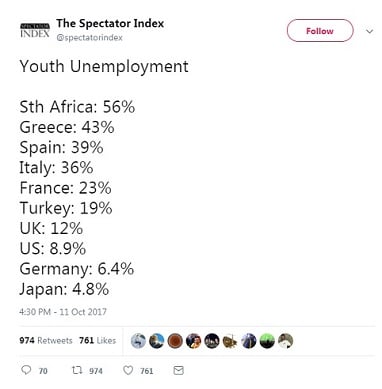Is South Africa’s youth unemployment rate 56%, as a tweet claimed?
This article is more than 6 years old
On 11 October 2017 a Twitter account called The Spectator Index tweeted a ranking of youth unemployment rates from around the world.

South Africa’s youth unemployment rate was ranked highest at a whopping 56%.
An Africa Check follower asked us to check the numbers.
The term “youth” is generally considered to include people aged 15-24 by international organisations. However, South Africa’s government considers a larger group.
The country’s National Youth Development Policy Framework defines “young people” as those aged 14 to 35, arguing that “historical imbalances in the country are yet to be fully addressed”. However, South Africa’s statistics agency, Statistics South Africa, only surveys people aged 15-64 for their quarterly labour force survey.
During April to June of 2017, a total of 4 million young people aged 15-34 were unemployed in South Africa, according to Statistics South Africa This produced an unemployment rate of 39.2%.
When the expanded definition of unemployment is considered (which includes unemployed people who have given up looking for work) the unemployment rate for people aged 15-34 increases to 49.5%.
The most recent unemployment estimate for people aged 15-24 in South Africa was 55.9%. When rounded up, this is the same figure cited in the tweet. The expanded unemployment rate (including unemployed people not looking for work) was 67.4%.
The International Labour Organisation calculates annual unemployment estimates. Their 2016 estimates included unemployment rates for 79 countries around the world.
But you have to be careful when comparing unemployment rates from different countries. The organisation cautions against drawing comparisons. This is because you can not safely assume that employment data from different countries is comparable.
Different countries use different kinds of surveys with different questions. Definitions of unemployment vary, as do the ways that a sample of the population is selected. All of these things can produce different results.
With that in mind, South Africa’s youth unemployment rate of 53.4% was the second highest of the 79 countries surveyed in 2016.
Bosnia and Herzegovina had the highest unemployment rate with 54.3% of their youth unemployed. Kosovo was in third place (52.4%), followed by Macedonia (48.2%) and Greece (47.3%).
The only other African country in the top ten was Namibia, where 44.9% of young people were estimated to be unemployed. - Kate Wilkinson (12/10/2017)
Have you seen tweets that need fact-checking? Tweet us at @AfricaCheck!
Additional reading:
https://africacheck.org/factsheets/factsheet-unemployment-statistics-in-south-africa-explained/

South Africa’s youth unemployment rate was ranked highest at a whopping 56%.
An Africa Check follower asked us to check the numbers.
How old are the youth?
The term “youth” is generally considered to include people aged 15-24 by international organisations. However, South Africa’s government considers a larger group.
The country’s National Youth Development Policy Framework defines “young people” as those aged 14 to 35, arguing that “historical imbalances in the country are yet to be fully addressed”. However, South Africa’s statistics agency, Statistics South Africa, only surveys people aged 15-64 for their quarterly labour force survey.
During April to June of 2017, a total of 4 million young people aged 15-34 were unemployed in South Africa, according to Statistics South Africa This produced an unemployment rate of 39.2%.
When the expanded definition of unemployment is considered (which includes unemployed people who have given up looking for work) the unemployment rate for people aged 15-34 increases to 49.5%.
The most recent unemployment estimate for people aged 15-24 in South Africa was 55.9%. When rounded up, this is the same figure cited in the tweet. The expanded unemployment rate (including unemployed people not looking for work) was 67.4%.
Unemployment rates not always comparable
The International Labour Organisation calculates annual unemployment estimates. Their 2016 estimates included unemployment rates for 79 countries around the world.
But you have to be careful when comparing unemployment rates from different countries. The organisation cautions against drawing comparisons. This is because you can not safely assume that employment data from different countries is comparable.
Different countries use different kinds of surveys with different questions. Definitions of unemployment vary, as do the ways that a sample of the population is selected. All of these things can produce different results.
South Africa ranks high
With that in mind, South Africa’s youth unemployment rate of 53.4% was the second highest of the 79 countries surveyed in 2016.
Bosnia and Herzegovina had the highest unemployment rate with 54.3% of their youth unemployed. Kosovo was in third place (52.4%), followed by Macedonia (48.2%) and Greece (47.3%).
The only other African country in the top ten was Namibia, where 44.9% of young people were estimated to be unemployed. - Kate Wilkinson (12/10/2017)
Have you seen tweets that need fact-checking? Tweet us at @AfricaCheck!
| CORRECTION: This spot check previously stated that 6 million young people were unemployed during April to June of 2017. This figure relates to broad unemployment. The correct figure for narrow unemployment is 4 million. We apologise for the error. |
Additional reading:
https://africacheck.org/factsheets/factsheet-unemployment-statistics-in-south-africa-explained/

Add new comment